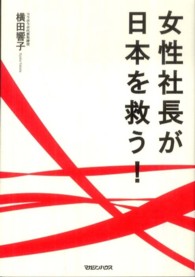- ホーム
- > 洋書
- > 英文書
- > Politics / International Relations
Full Description
South Korea is renowned as one of the success stories of fast economic development. The Korean developmental state was a highly efficient, meritocratic, and fully monopolized coercive force. These resources were skilfully leveraged to shape the direction of private sector actors towards strategic initiatives. However, these very same resources could have resulted in the bureaucracy retaining its power indefinitely. Instead, step-by-step, the resources of the bureaucracy, which serviced the authoritarian leadership in the developmental period, were exercised towards democratization. What were the conditions that made this transformation possible?
The Experience of Democracy and Bureaucracy in South Korea addresses this question, filling the existing gap in the academic literature and presenting political implications. It explores the ways in which bureaucracy may not only be compatible with democracy but, more ambitiously, the conditions under which it can enhance it. The chapters examine the unique systems and institutions of the Korean bureaucracy including the National Election Commission, the police force, local government, the ceiling recruitment strategy, and procurement policy.
This timely collection will be of interest to researchers, graduate and undergraduate students in public administration and policy. It will also be a useful reference for bureaucrats in developing countries who seek to design policy for bureaucracy in concurrence with democratization.
Contents
Introduction: Bureaucracy and Korean Development
Revisiting Bureaucratic Dysfunction: The Role of Bureaucracy in Democratization; Tobin Im
Electoral Democracy and the Role of the Electoral Management Body in South Korea; Seon-Gyu Go
Rediscovering Korea's Local Bureaucracy: The Unsung Players in the Nation's Democratization Process; Shi-Chul Lee
Bureaucracy, Regulatory Management, and Korean Democracy; Hyukwoo Lee
Change and Continuity in Police Organizations: Institution, Legitimacy, and Democratization; WonHyuk Cho
Supreme Audit Institution Bureaucracy and Democracy: Korean SAI (BAI)'s Functions for Democratization; Nanyoung Kim
Public Procurement Policy in South Korea: Approaches to Sustainable Development and Anti-corruption; Jesse W. Campbell
The Olympics, Soft Power, and Democratization: The Role of Bureaucracy; Kwnag-Hoon Lee
The Ceiling Strategy as Policy: Limiting Bureaucratic Expansion and Democratization; Hyemin Choi and Jisu Jeong








